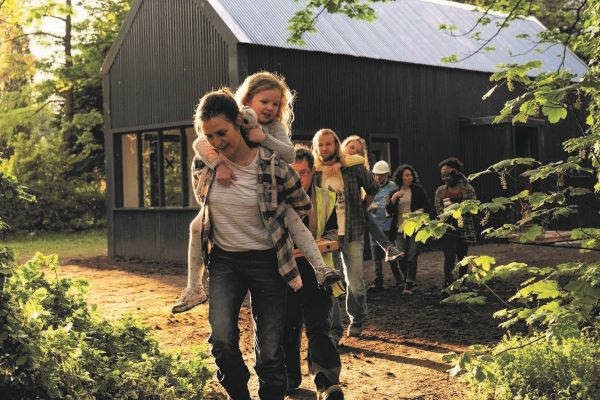After two unqualified successes in her first two features – Mamma Mia! and The Iron Lady, Phyllida Lloyd went back to the world of theatre in which she made her name. Having worked with actor Clare Dunne in a series of all-female productions of Shakespeare, the two women have collaborated again in this Irish drama about a woman who leaves an abusive marriage and literally rebuilds her life. Dunne co-writes and stars in a capable but contrived drama that sacrifices insight for accessibility.
Sandra (Dunne) leaves her husband after years of abuse. A maimed hand after he discovers money she has stashed away for her escape is the final straw. The decision plunges Sandra and her two young daughters into Dublin’s housing crisis. As she moulders on the interminable waiting list for public housing while the city pays for a room in a hotel, she comes across a video about an eco-home that can be built for a mere €35,000. A kindly employer (Harriet Walter) gifts her a plot of land in her own garden, and Sandra sets about her project while trying to fight off her ex’s attempts to get the girls through the court.
Herself tries to knit two huge subjects together and there are too many dropped stitches. The empowering message is undercut by a whimsical series of coincidences and a melodramatic streak. Sandra is a woman who deserves some good fortune but constantly lucks into situations that belies the film’s title. Walter’s cantankerous but lovable employer gifts her land and loans her money, rough diamond builder Aido (Conleth Hill) is persuaded into overseeing the whole project, and Sandra is assisted by a happy band of volunteers giving up their weekends for free. Paddy Breathnach‘s quietly simmering, heart-breaking Rosie takes on the housing issue with more grounded, clear-headed results.
The film is then a tonal jumble of uplifting montages (with some really strange musical choices) of the house rising like Sandra’s own metaphysical phoenix, slamming against the grind of custodial visits to the kids’ weaselly dad (Ian Lloyd Anderson, believably manipulative) and a court appearance brought about by her younger daughter’s reluctance to see her dad. Lloyd and Dunne simply can’t resist the syrup so it skates over any larger points about the housing crisis and simultaneously cheapens the domestic violence aspect. They also can’t resist a punch-the-air monologue for Sandra in the courtroom. And when they decide to course-correct and introduce some further obstacles, the melodramatic impulses come surging in.
Herself is undoubtedly easy to watch, not least thanks to some excellent performances. Dunne naturally shines in a character she has inhabited from its conception. There is something of the compassion and easy likeability of pre-stardom Brie Larson’s role in Short Term 12. Hill is all gruff charm and twinkle, and Walter once again shows why she appears to be in absolutely everything these days. Molly McCann and Ruby Rose O’Hara also shine as Sandra’s winsome daughters. It is however, this very ease of consumption that rather blunts its impact.
Overly reliant on narrative contrivance, and too readily calibrated for easy tears, Herself fails to tackle either of its big issues as well as they deserve. The opening scene is as powerful as it gets – dramatic, tense and ultimately cathartic, but it never gets close to that level again. It is finding its audience – the reception so far has been pretty rapturous – and it is difficult to grudge a film success when its heart is so clearly in the right place. It just feels sanitised and neatly packaged for the Military Wives crowd. Its absolute worst offence is that it somehow makes a drama that deals with domestic abuse twee.
Screening as part of BFI London Film Festival Thu 8 Oct 2020
